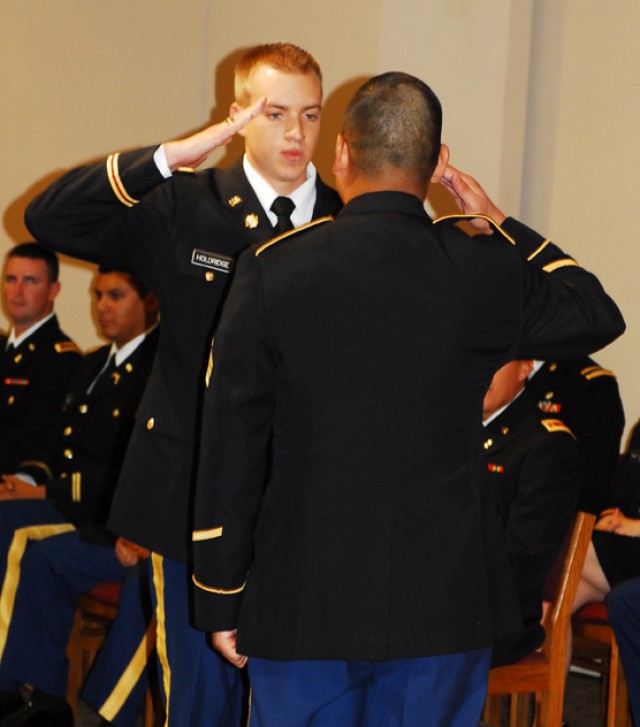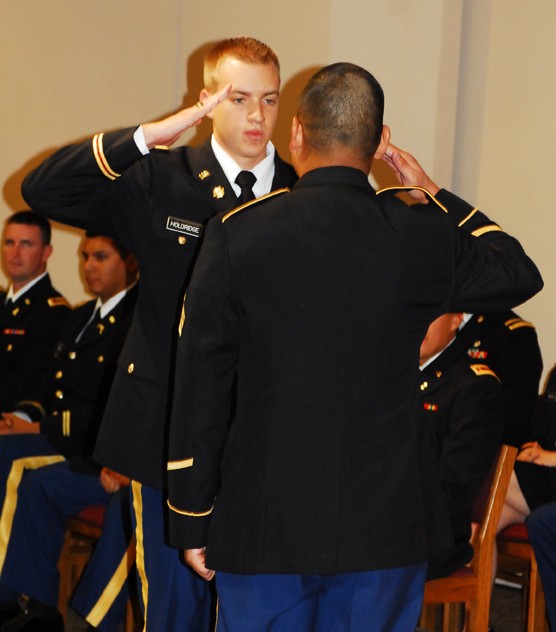FORT HOOD, Texas-A college graduation is a significant milestone. For most, it represents the culmination of years of work, study and test anxiety; a segue into a new life, or at least the potential for a new life.
For twelve students from Texas State University-San Marcos, May 13 represented a change even more drastic than most. Because, to borrow a phrase, they're in the Army now.
The students were the most recent crop of 2nd lieutenants to be commissioned from the university's Reserve Officer Training Corps program.
Guest speaker, Maj. Shawn Creamer, the executive officer for the 2nd Brigade Combat Team, 1st Cavalry Division, recently returned from a 12-month deployment to Iraq. Prior to this assignment, he was stationed in Washington, DC, as a manager of the US Army's Stryker vehicle, possibly most highly visible symbol of the Army's emphasis on lethality and mobility in a generation. He also took part in developing the transition team concept, which places seasoned Army commissioned and non-commissioned officers among Iraqi Army and police units to train and mentor the Iraqi Security Forces on security.
"You need to be a subject matter expert of your position and the master of your domain," he said. "To be an effective officer requires you to be an effective communicator, and this includes being capable of speaking, writing, briefing and issuing orders effectively."
Creamer feels his experience as an infantry officer in "muddy boots" assignments, throughout multiple deployments, plus his time at Department of the Army level jobs gives him insight into what the "pentathlete" officer must do in the current operational environment.
"Officers are expected to be problem solvers and to be capable of handling the vast majority of problems they encounter," he continued. "You need to be intellectually curious and capable of viewing the world at large. Do not become overly focused on the moment. Take into account the entire situation and be willing to sacrifice personal or individual needs for the greater good of the organization."
Newly enlightened, the cadets pledged the Oath of Office, required by U.S. Code that all officers must recite it prior to receiving a commission. It traditionally is repeated again at promotions, but is not mandatory since it is considered a continuous pledge that is not required to be recited again.
The most significant difference between it and an enlisted Soldier's Oath of Enlistment is that it does not require the officer to obey all orders as enlisted Soldiers must do. Instead, the officer has the obligation to follow only lawful orders, according to Creamer.
Following this, family members and friends were brought on stage to "pin" the cadets, who had all already been wearing their rank under masking tape. The families removed the tape to display the brand new gold bars of a 2nd Lieutenant.
Traditionally, newly-commissioned officers from all branches of service present a silver dollar to the first enlisted service member to render them a salute. While the origins of the tradition are unclear, some say it comes from the 19th century. The dollar should have some significance, like it was minted the year of the commissioning, it was minted the year the 2nd Lieutenant was born or it was minted 100 years prior to the ceremony.
Typical "first salutes" come from current or prior enlisted family or friends of the new officer, or among one of their commissioning source instructors. The presentation of the coin symbolically acknowledges the receipt of respect due the new lieutenant.
With the ceremony complete, the new lieutenants were officially among the newest members of the U.S. Army Officer Corps.
"To be a part of this ceremony is such an honor," said Creamer. "The commissioning of these new officers is a promise from our nation that it will continue to put our brightest into positions of authority to ensure our security."
"It feels wonderful to have completed something I've been striving for," explained 2nd Lt. Charles Leddy, from Maypearl, Texas, who commissioned into the aviation branch.
Leddy's new rank was unveiled by his wife and parents, and he was happy he had the opportunity to get them involved.
"I was glad that could let my family see what I've been working toward," he said. "It was great."
"I thought the ceremony went really well," said 2nd Lt. Austin Holdridge, from Palmdale, Calif., who joined the transportation branch.
Holdridge was glad he had the chance to glean a little last-minute advice from the guest speaker's speech.
"A big part of the next couple years is going to be about taking advice from senior officers, non-commissioned officers and junior enlisted," he said. "You've got to take the advice you can get and try to be the best you can be."
With their ROTC days now behind them, the lieutenants will face different challenges as they join various branches, but will all soon have the distinct honor of leading their fellow Soldiers.




Social Sharing